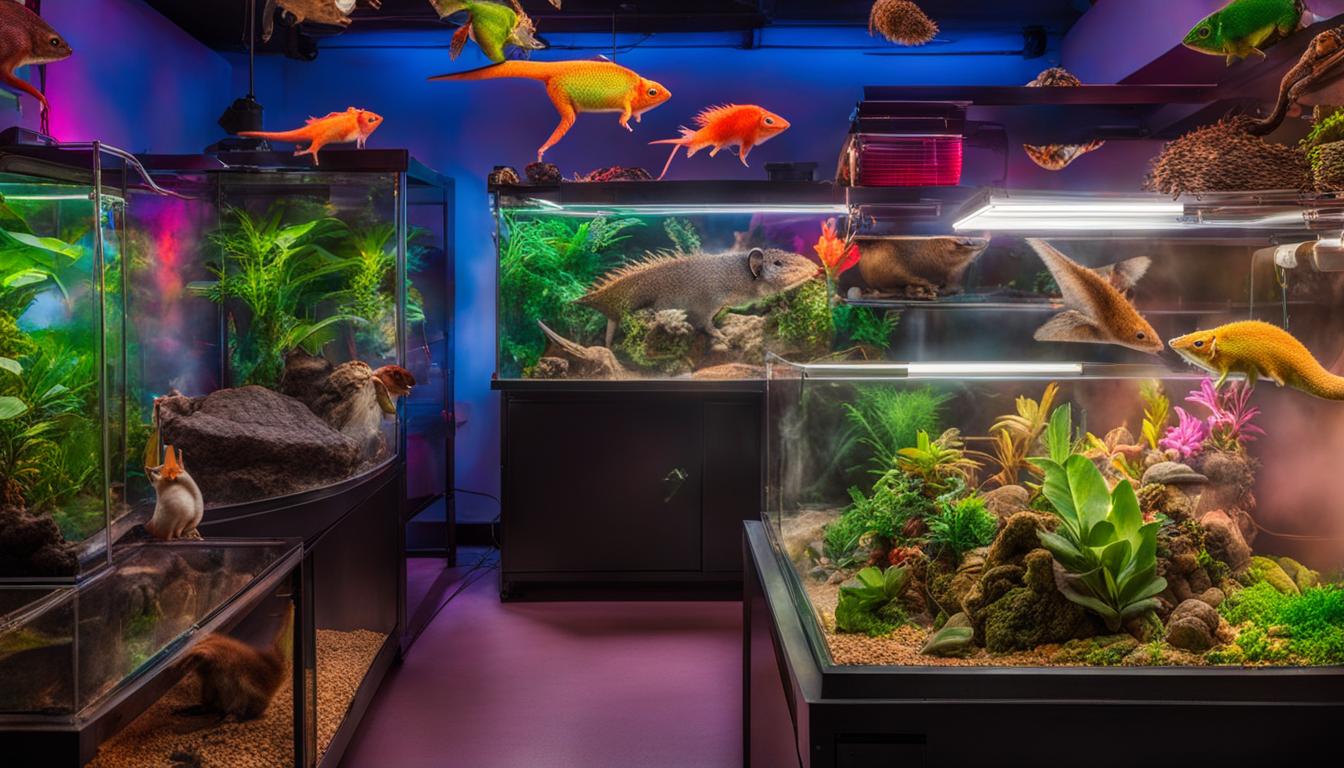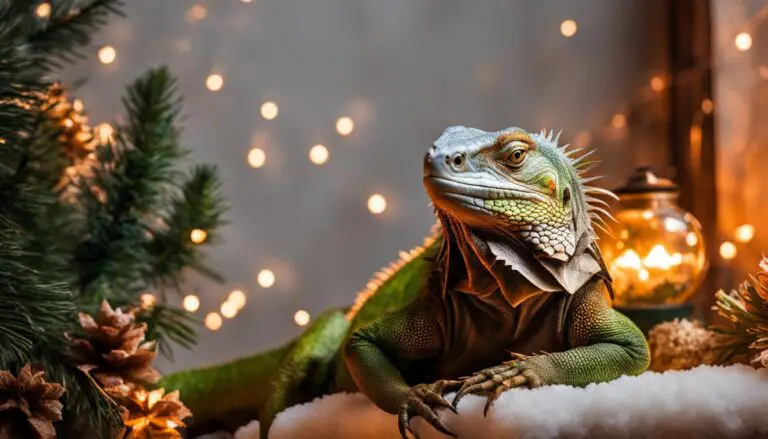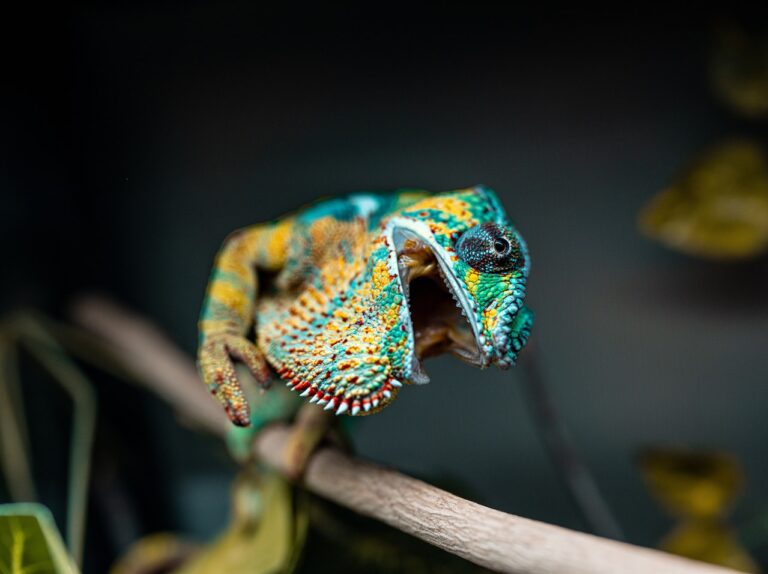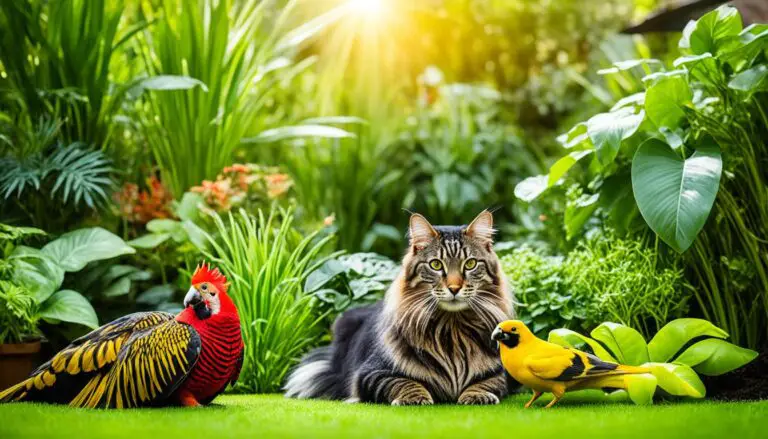Exotic Pet Care Guide: Tips for Rare Pets
Proper care for exotic pets requires specialized knowledge and attention to their unique needs. From providing the right habitat to ensuring a well-balanced diet, there are several essential aspects to consider when it comes to exotic pet care. In this comprehensive guide, we will provide you with expert advice, best practices, and essential care tips to help you maintain the health and well-being of your exotic pets.
Key Takeaways:
- Exotic pets require specific care that differs from traditional pets.
- Each species of exotic pet has unique needs for habitat, diet, grooming, socialization, and preventive care.
- Research and understanding your exotic pet’s specific requirements is crucial for their health and happiness.
- Consulting with exotic pet experts, such as veterinarians, can provide valuable guidance.
- Responsible ownership and providing proper care are essential for exotic pets to thrive.
What is an Exotic Pet?
Exotic pets encompass a diverse range of animals that are distinct from traditional household pets. These unique creatures, such as chinchillas, hamsters, ferrets, iguanas, parrots, and more, require specialized care to thrive. Before welcoming an exotic pet into your home, it’s essential to understand their specific needs regarding habitat, diet, grooming, socialization, and preventive care.
Unlike dogs or cats, exotic pets have distinct requirements that vary based on their species. For example, while chinchillas need spacious enclosures and dust baths, parrots require mental stimulation and social interaction. By gaining a comprehensive understanding of your chosen exotic pet, you can ensure their health, happiness, and overall well-being.
Engaging in research and seeking expert advice from veterinarians or exotic pet specialists can provide valuable insights into the specific care requirements of different exotic pets. This knowledge will help you create a suitable living environment and provide them with the necessary care they need.
Types of Exotic Pets
Exotic pets come in various shapes, sizes, and species. Here are some examples of common exotic pets:
- Ferrets: Fun-loving and sociable animals that require regular exercise and a special diet.
- Iguanas: Fascinating reptiles with specific habitat needs, UVB lighting requirements, and a varied herbivorous diet.
- Parrots: Highly intelligent birds that thrive on mental stimulation, social interaction, and a balanced diet of seeds, fruits, vegetables, and occasional treats.
- Chinchillas: Adorable and active rodents that need spacious cages, dust baths, and a diet consisting of hay, pellets, and occasional treats.
- Hamsters: Small and furry companions that require proper cage setup, exercise wheels, a well-balanced diet, and sufficient bedding material.
Understanding the specific needs of each type of exotic pet is crucial for their overall well-being. Whether you’re considering a feathered friend, a scaly reptile, or a furry companion, remember that proper research and preparation are key to providing a safe and enriching environment for your exotic pet.
Nutrition for Your Exotic Pet
Proper nutrition is vital for the overall health and well-being of exotic pets. Each species has unique dietary needs based on their natural diet. It is important to provide a well-balanced diet that meets your exotic pet’s specific nutritional needs.
Reptiles and Their Dietary Requirements
Reptiles, such as snakes, lizards, and turtles, have specific dietary requirements based on whether they are omnivores, carnivores, or insectivores. For example, herbivorous reptiles like iguanas require a diet rich in leafy greens and vegetables, while carnivorous reptiles like snakes need a diet consisting mainly of rodents or insects.
Rodents and Their Nutritional Needs
Rodents like guinea pigs and rabbits also have different nutritional needs depending on their species and age. While guinea pigs require a diet high in fresh hay, vegetables, and vitamin C-rich fruits, rabbits need a diet consisting mainly of hay, leafy greens, and a small amount of pellets.
Birds and Their Varying Dietary Requirements
Birds have varying dietary requirements based on their species, beak type, and nutritional needs. For example, seed-eating birds need a diet consisting mainly of high-quality seeds, while nectar-feeding birds, like hummingbirds, require a diet consisting of nectar or specially formulated nectar substitute. It is essential to provide a balanced diet that includes a variety of seeds, pellets, fresh fruits, and vegetables.
Specialized Diets for Exotic Pets
Some exotic pets may have specialized diets that require specific nutrients. For instance, sugar gliders, small marsupials native to Australia, have a diet that consists of a balanced blend of fruits, vegetables, nectar, and protein. Similarly, certain primates, like marmosets and tamarins, have dietary needs that include a combination of fruits, vegetables, insects, and specialized primate pellets.
Remember, providing a proper diet is crucial for the health and well-being of your exotic pet. Consult with an exotic pet veterinarian or nutritionist to ensure you are meeting all of your pet’s nutritional needs.
| Exotic Pet | Dietary Requirements |
|---|---|
| Reptiles | Diet varies based on species and whether they are omnivores, carnivores, or insectivores. |
| Rodents | Diet varies based on species, with guinea pigs requiring hay, vegetables, and fruits, while rabbits need hay, leafy greens, and pellets. |
| Birds | Diet varies based on species, beak type, and nutritional needs, with seeds, pelleted feeds, fruits, and vegetables as staple components. |
| Specialized Exotic Pets | May have specific dietary requirements that include a combination of fruits, vegetables, nectar, protein, insects, or specialized pellets. |
Housing for Your Exotic Pet
Providing a proper living environment is essential for the health and well-being of exotic pets. Each species has specific requirements for their habitat, including size, lighting, temperature, humidity, cage construction, and bedding. By creating a suitable habitat that meets these needs, you can ensure a happy and healthy life for your exotic pet.
Reptiles and Their Habitat
Reptiles, such as snakes, lizards, and turtles, have unique requirements for their habitat. Temperature and humidity play crucial roles in their overall well-being. It’s important to set up an enclosure that provides the appropriate temperature gradient and humidity levels for your reptilian friend. The habitat should also include proper lighting, such as UVB bulbs, to support their physiological needs.
Rodents’ Safe and Comfortable Space
For rodents like mice and hamsters, it’s essential to create an escape-proof and chew-proof enclosure. These small pets have a knack for exploration and can easily find a way to venture outside their cage if not properly secured. Make sure to choose a sturdy cage with narrow wire spacing and provide plenty of tunnels, climbing structures, and bedding materials to keep them mentally stimulated and comfortable.
Birds’ Freedom to Fly and Perch
Birds are highly active creatures that require spacious cages to accommodate their natural behaviors. It’s crucial to provide a large birdcage that allows for ample flying space. Birds also need areas to perch and exercise their feet. Including various perches of different sizes and textures will keep their feet healthy and engage their natural instincts. Additionally, ensure the cage is equipped with toys, swings, and other enrichment items to prevent boredom.
Creating a Safe and Stimulating Environment
Regardless of the type of exotic pet you have, it’s important to ensure their habitat is safe and enriching. Remove any hazardous items that could cause harm, such as sharp objects or toxic plants. Provide appropriate hiding spots, burrowing areas, or branches for climbing, depending on your pet’s natural behaviors. Regularly clean and disinfect the habitat to maintain a hygienic environment.
Preventive Care for Your Exotic Pet
Proactive measures are crucial to safeguard the health and well-being of your exotic pet. By implementing a comprehensive preventive care plan, you can detect hidden signs of illness and maintain your pet’s normal health parameters. Here are some essential preventive care measures for exotic pets:
1. Vaccinations
Your exotic pet may require regular vaccinations to protect against various contagious diseases. Consult with your veterinarian to understand the appropriate vaccination schedule and the specific vaccines recommended for your pet’s species.
2. Parasite Prevention
To prevent parasitic infestations, regular parasite prevention is paramount. Depending on the type of pet, treatments for internal and external parasites, such as fleas, ticks, mites, and worms, may be necessary. Follow your veterinarian’s guidance to ensure your pet stays parasite-free.
3. Spaying or Neutering
Spaying or neutering is an important preventive care measure for exotic pets. It not only helps control the pet population but also reduces the risk of certain health issues, such as reproductive cancers. Talk to your veterinarian about the ideal timing for spaying or neutering your pet.
4. Dental Care
Just like cats and dogs, exotic pets may also be prone to dental problems. Regular dental care, including brushing, providing appropriate chew toys, and professional dental cleanings, can promote good oral health and prevent dental issues that can impact your pet’s overall well-being.
5. Wing Trimming
For birds and certain species of exotic pets, wing trimming is an important preventive measure. Trimming the feathers can prevent injury from accidental escapes or collisions and help maintain a safe environment within your home. Consult a veterinarian experienced in avian care for proper wing trimming techniques.
6. Annual Blood Work
Annual blood work is a valuable tool for assessing your exotic pet’s overall health. It provides insight into organ function, blood cell counts, and other essential markers. Regular blood work can help detect underlying health issues and monitor any changes, enabling early intervention and effective management.
Remember, preventive care is crucial for ensuring your exotic pet’s long-term health and well-being. By consulting with an exotic pet expert and adhering to a customized preventive care plan, you can provide the best possible care for your unique pet.
Keep in mind that the preventive care measures listed above serve as general guidelines. Your specific exotic pet may have unique needs and requirements. Consult with an experienced exotic pet veterinarian to create a tailored preventive care plan that meets the specific needs of your beloved pet.
Continue to Section 6: Choosing the Right Exotic Pet
Choosing the Right Exotic Pet
When it comes to selecting an exotic pet, making an informed decision is essential. Considerations such as the suitability of the species for your lifestyle, the environmental requirements of the pet, the lifespan and size of the pet, and the specific diet and behavior of the pet should be taken into account. By researching and understanding these factors, you can ensure that you provide appropriate care for your chosen exotic pet.
Species Suitability: Every exotic pet has unique characteristics and needs. Some species may require a lot of physical and mental stimulation, while others may be more independent. Consider your lifestyle and preferences to find a species that aligns well with your capabilities and interests.
Environmental Requirements: Exotic pets have specific environmental needs that must be met for their health and well-being. Some species may require a warm and humid habitat, while others need spacious enclosures or access to outdoor areas. It’s crucial to research and provide a suitable living environment for your chosen exotic pet.
Lifespan and Size: Exotic pets can have varying lifespans and sizes. Some species may live for several years, while others can live for decades. Additionally, the size of the pet can influence the space it requires and the resources it needs. Consider the long-term commitment and the space you have available before choosing a pet with a longer lifespan or larger size.
Diet and Behavior: Each exotic pet has specific dietary requirements and behavior patterns. Some may need a specialized diet consisting of live insects or fresh fruits and vegetables, while others may have strict feeding schedules. Additionally, understanding a pet’s behavior, such as their activity level, social needs, and potential aggression, is crucial for their welfare and your interaction with them.
Benefits of Researching Exotic Pet Considerations
Researching and understanding the considerations mentioned above can help you make an informed decision when choosing an exotic pet. It ensures that you can provide the necessary care, meet their specific needs, and create a suitable environment for their well-being. Taking the time to learn about the requirements and intricacies of different exotic pet species will enhance your ability to provide proper care and build a strong bond with your new companion.
| Considerations | Why It Matters |
|---|---|
| Species Suitability | Choosing a species that aligns with your lifestyle ensures a more fulfilling and harmonious pet-owner relationship. |
| Environmental Requirements | Providing a suitable living environment is crucial for the physical and mental well-being of your exotic pet. |
| Lifespan and Size | Understanding the expected lifespan and size of a pet helps you plan for long-term care and ensure you have adequate space. |
| Diet and Behavior | Meeting the specific dietary needs and understanding the behavior of your pet promotes its overall health and happiness. |
By carefully considering these factors and conducting thorough research, you can choose an exotic pet that fits well with your lifestyle, provide appropriate care, and forge a lasting bond with your unique companion.
Exotic Pets and Legal Considerations
When considering owning an exotic pet, it is crucial to understand the legal requirements and regulations associated with their ownership. The laws regarding exotic pet legality vary from region to region, and some species may be prohibited as pets or require specific permits and licenses.
Researching the legal considerations is essential to ensure that you comply with the law and provide the best care for your exotic pet. It is important to know which species are allowed in your area and whether any permits or licenses are necessary to own them.
By understanding and following the legal requirements, you can enjoy the companionship of an exotic pet while maintaining a responsible and legal status. Failure to comply with these regulations can result in legal consequences and potentially harm the well-being of the animal.
If you’re unsure about the legal requirements for owning an exotic pet, consult with local authorities or organizations knowledgeable about exotic pet ownership in your area. They can provide detailed information about the permits and licenses necessary for specific species and guide you through the process.
Remember, responsible ownership includes not only providing proper care but also abiding by the legal requirements to protect both you and your exotic pet.
Keep in mind that exotic pet legality can change over time, so regularly stay updated on the regulations to ensure ongoing compliance. As a responsible pet owner, it is your duty to be aware of and adhere to the laws concerning exotic pet ownership to ensure the safety and welfare of both your pet and the surrounding community.
Examples of Exotic Pets and Their Legal Status in Different Regions
| Exotic Pet | North America | Europe | Asia |
|---|---|---|---|
| African Pygmy Hedgehog | Legal in most regions | Varies by country | Varies by country |
| Ball Python | Legal in most regions | Legal in most countries | Legal in most countries |
| Capybara | Illegal in most regions | Illegal in most countries | Legal in some countries |
| Sugar Glider | Legal in most regions | Illegal in some countries | Varies by country |
Exotic Pet Care on a Budget
While caring for exotic pets can sometimes be costly, there are ways to provide proper care without breaking the bank. By being creative and resourceful, you can save money while still ensuring the health and well-being of your beloved exotic pet. Here are some budget-friendly tips:
Create DIY Toys and Perches
Instead of splurging on expensive toys and perches, unleash your creativity and make them at home. Use household items such as cardboard boxes, old t-shirts, and untreated wood to create engaging toys and comfortable perches for your exotic pet. Not only will this save you money, but it will also provide enrichment and stimulation for your pet.
Consider Second-Hand Equipment
When setting up your exotic pet’s habitat, don’t overlook the option of purchasing second-hand equipment. Look for local pet stores, online forums, and classified websites where you can find used enclosures, heat lamps, filters, and other necessary items at a fraction of the cost. Just make sure to thoroughly clean and sanitize the items before introducing them to your pet.
Explore Energy-Saving Options
Energy bills can quickly add up when providing the appropriate heating and lighting for your exotic pet’s habitat. To save money on utilities, consider exploring cheaper tariffs or payment plans offered by your energy provider. Additionally, switch to energy-efficient light bulbs and invest in programmable thermostats to regulate temperatures effectively without unnecessary energy consumption.

Providing affordable exotic pet care is possible with a little creativity and resourcefulness. By making your own toys and perches, considering second-hand equipment, and exploring energy-saving options, you can save money while still ensuring the well-being of your exotic pet. Remember that the most important thing is to provide a loving and nurturing environment, and it doesn’t always have to come with a hefty price tag.
Responsible Ownership and Rehoming
Responsible exotic pet ownership goes beyond providing basic care. It involves ensuring the well-being of your pet and taking steps to avoid the illegal exotic pet trade. By being a responsible owner, you contribute to the welfare of exotic animals and help protect their natural habitats.
Here are some key principles of responsible ownership:
- Research and educate yourself: Take the time to learn about the specific needs and requirements of your exotic pet. Understand their natural behavior, diet, habitat, and socialization needs. This knowledge will allow you to provide appropriate care and create a suitable environment for your pet’s well-being.
- Follow legal regulations: Different regions have varying laws and regulations regarding exotic pet ownership. Make sure you are aware of and comply with any permits, licenses, or restrictions in your area. Avoid supporting the trade of wild-caught animals, as it contributes to environmental issues and threatens species’ survival.
- Provide proper care: Exotic pets have specialized needs, including nutrition, housing, grooming, and veterinary care. Meet their dietary requirements, create an appropriate habitat, provide regular grooming, and schedule routine check-ups with an exotic pet veterinarian. Prioritize your pet’s health and well-being.
Responsible ownership of exotic pets is a commitment to providing the highest standard of care and conservation. By doing so, we can ensure the long-term welfare of these extraordinary animals.
The Importance of Rehoming
Sometimes, circumstances arise that prevent exotic pet owners from providing adequate care. In such cases, it is crucial to find suitable rehoming options rather than abandoning or releasing the pet into the wild.
Rehoming can be a responsible and compassionate decision for both you and your pet. It ensures that your pet’s well-being is prioritized and that they receive the care they need in a suitable environment.
Here are some steps to consider when rehoming an exotic pet:
- Reach out to rescue organizations: There are specialized rescue organizations and sanctuaries that can help find a new home for your exotic pet. These organizations often have expertise in caring for exotic animals and can ensure a smooth transition for your pet.
- Consult with specialist vets: Exotic pet veterinarians can provide guidance on appropriate rehoming options. They might have connections with individuals or organizations looking to adopt or provide temporary care for exotic pets.
- Screen potential adopters: When considering potential new owners, ensure they have the knowledge, experience, and resources to care for your exotic pet properly. Ask for references and have open conversations about your pet’s needs and requirements.
Remember, rehoming your exotic pet should always be done responsibly and with their best interests at heart.
| Advantages of Responsible Ownership and Rehoming | Disadvantages of Irresponsible Actions |
|---|---|
| • Ensures the well-being of exotic pets • Contributes to conservation efforts • Promotes ethical treatment of animals • Supports responsible breeding programs |
• Risk to the pet’s health and well-being • Negative impact on the environment • Illegal wildlife trafficking • Potential ecological imbalance |
Seeking Expert Advice for Exotic Pet Care
When it comes to caring for an exotic pet, seeking expert advice is essential. Exotic pet experts, such as veterinarians with experience in exotic pet care, can provide invaluable guidance and support to ensure the health and well-being of your unique companion. Whether you are a first-time exotic pet owner or have years of experience, consulting with an expert can provide you with the knowledge and resources to provide the best care for your beloved pet.
The Benefits of Exotic Pet Advice
Consulting with an exotic pet expert offers several benefits that can help you navigate the complexities of exotic pet care:
- Specialized Knowledge: Exotic pet experts possess in-depth knowledge of various exotic species, including their specific dietary requirements, habitat needs, grooming techniques, and preventive care measures. This expertise can help you tailor your pet’s care plan to meet their unique needs.
- Preventive Care: Exotic pet experts can guide you in developing a comprehensive preventive care plan for your pet. From vaccinations to parasite prevention and regular check-ups, these professionals can ensure that your pet remains healthy and protected against potential illnesses or diseases.
- Behavioral Guidance: Exotic pets can sometimes exhibit behavior that may be challenging to understand or manage. Consulting with an expert can help you identify the underlying causes of your pet’s behavior and implement appropriate training techniques to address any issues.
Finding an Exotic Pet Veterinarian
One of the key experts you’ll need in your exotic pet care journey is a trusted exotic pet veterinarian. These professionals specialize in the medical care of exotic pets and can provide vital healthcare services to ensure your pet’s well-being. Here are some steps you can take to find the right exotic pet veterinarian:
- Research: Look for veterinarians in your area who have experience and expertise in exotic pet care. Check their credentials, online reviews, and client testimonials to ensure they are well-qualified.
- Recommendations: Seek recommendations from fellow exotic pet owners, local exotic pet clubs, or reputable online communities. Their firsthand experiences can help you find reliable and trusted exotic pet veterinarians.
- Consultation: Schedule a consultation with potential exotic pet veterinarians to discuss your pet’s specific needs, ask questions, and assess their level of expertise and compatibility with you and your pet.

Additional Expert Resources
In addition to exotic pet veterinarians, there are other resources available to seek expert advice for exotic pet care:
“Through consulting with exotic pet experts, you gain access to a wealth of knowledge, ensuring that you can provide the best care for your exotic pet and enhance their overall quality of life.”
| Resource | Description |
|---|---|
| Exotic Pet Organizations | Joining local or national exotic pet organizations can connect you with experts and fellow exotic pet owners who can provide advice and support. |
| Online Forums and Communities | Participating in online forums and communities dedicated to exotic pet care allows you to seek advice from experienced pet owners and experts. |
| Books and Publications | There are numerous books and publications written by experts in the field of exotic pet care. These resources can provide valuable information and guidance. |
Remember, consulting with exotic pet experts and finding the right exotic pet veterinarian are crucial steps in providing the best care for your unique companion. Their knowledge and guidance will help you navigate the challenges and nuances of exotic pet ownership, ensuring your pet’s happiness and well-being.
Common Challenges and Special Considerations for Exotic Pet Care
Caring for exotic pets can be a rewarding experience, but it also comes with unique challenges and considerations. These special considerations are important to ensure the health and well-being of your exotic pet. Let’s explore some of the common challenges and special considerations associated with exotic pet care.
Specific Environmental Requirements
Exotic pets often have specific habitat requirements that must be met to provide them with a healthy and comfortable living environment. For example, reptiles like iguanas require specific temperature and humidity levels, while certain birds need ample space for flying and perching. It is crucial to research and create an environment that closely mimics their natural habitat, promoting their physical and psychological well-being.
Unique Dietary Needs
Exotic pets have diverse dietary needs due to their distinct physiology and natural feeding behaviors. For instance, herbivorous exotic pets, such as chinchillas or rabbits, require a diet rich in fiber and specific nutrients to maintain their digestive health. On the other hand, carnivorous species like ferrets need a diet that includes high-quality animal protein. Providing a balanced and species-appropriate diet is essential for their overall health and longevity.
Potential Dangers from Certain Species
Some exotic pets can pose potential risks due to their natural behavior or physical characteristics. For example, certain reptiles may carry salmonella bacteria, which can be harmful to humans if proper hygiene practices are not followed. Additionally, some species may have regenerative or toxic capabilities that require extra caution during handling and interaction. It is crucial to educate yourself about any potential risks associated with your chosen exotic pet and take appropriate safety measures.
Specialized Veterinary Care
Exotic pets often require specialized veterinary care from professionals experienced in their unique needs. Not all veterinarians are trained in exotic pet care, so it is essential to find a qualified exotic pet veterinarian who can provide the necessary medical attention and advice. Regular veterinary check-ups are crucial to detect any health issues early on and ensure that your exotic pet receives the proper vaccinations, parasite prevention, and other necessary preventive care.
Understanding and addressing the challenges and special considerations of caring for exotic pets are vital for providing them with optimal care and ensuring their well-being. By creating a suitable environment, providing a balanced diet, being aware of potential dangers, and seeking specialized veterinary care, you can overcome these challenges and enjoy a fulfilling journey with your exotic pet.
Conclusion
Caring for exotic pets requires research, proper nutrition, suitable housing, preventive care, and expert advice. By understanding the unique needs of your chosen exotic pet and providing the necessary care, you can ensure their health and happiness. Remember to consult with an exotic pet expert for guidance specific to your pet’s needs. With responsible ownership and proper care, exotic pets can thrive in your home.
Exotic pets require a special level of care that differs from traditional pets. Each species has unique requirements for habitat, diet, grooming, socialization, and preventive care. It is essential to do thorough research to understand the specific needs of your exotic pet.
Providing a well-balanced diet and suitable housing is crucial for the overall health and well-being of exotic pets. Special attention should be given to their nutritional needs and creating a habitat that mimics their natural environment. Preventive care, such as vaccinations and parasite prevention, should be implemented to keep them healthy.
While taking care of exotic pets can come with challenges, seeking expert advice from exotic pet veterinarians is essential. They can provide guidance on proper care and address any specific needs your pet may have. With responsible ownership and attentive care, exotic pets can lead happy and fulfilling lives in your home.
Source Links
- https://alpineanimal.net/unique-care-for-unique-pets-providing-proper-care-for-exotic-pets/
- https://www.rspca.org.uk/adviceandwelfare/pets/other
- https://www.housesitmatch.com/blog/daily-care-for-exotic-pets-your-guide/
Peter Stones is the founder of Exotic Pets Place, the leading online resource for exotic pet care information.
With over 10 years of hands-on exotic pet ownership experience, he is deeply passionate about sharing his expertise to help others properly care for their unusual pets.
When he's not writing extensively researched articles or connecting with fellow exotic pet enthusiasts worldwide, you can find Peter at home tending to his own beloved menagerie of exotic animals.







